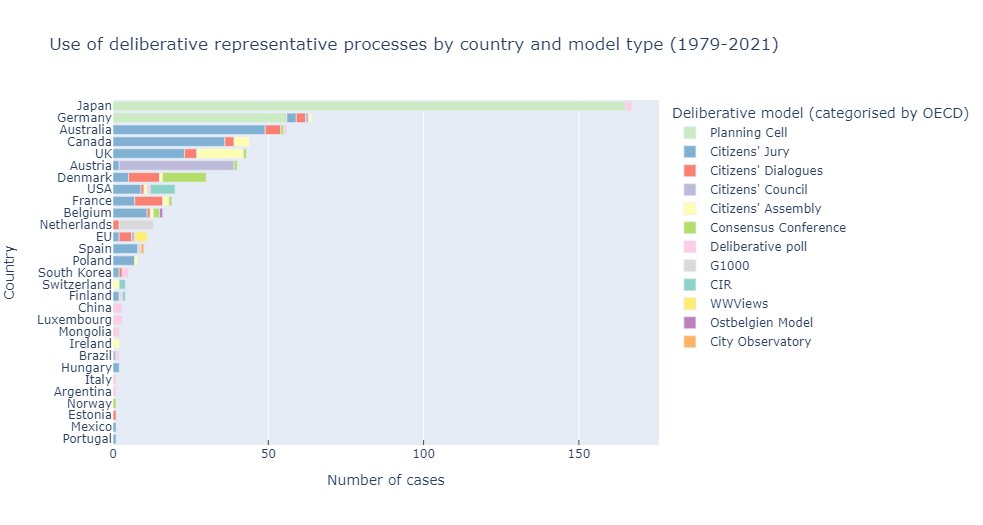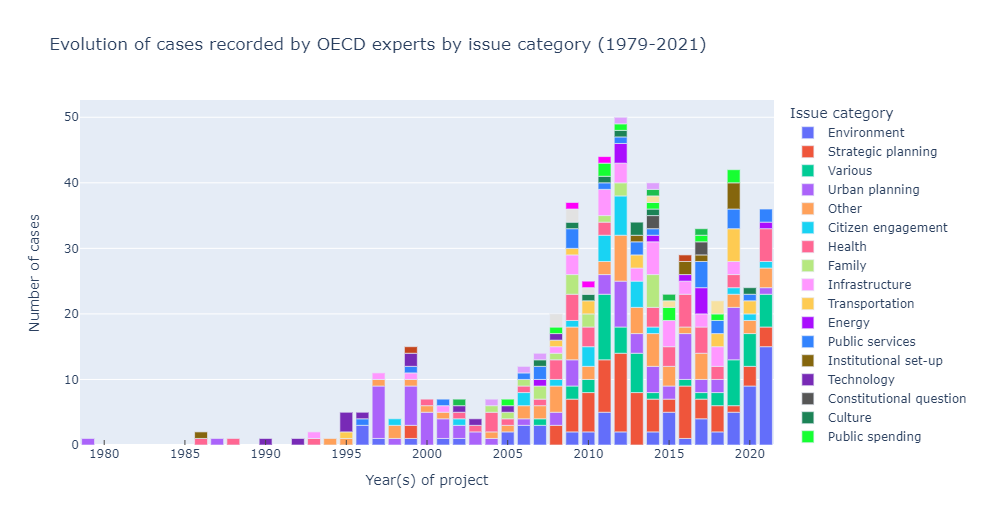
🌍Building on the work of OECD experts on innovative democracy - full report (A thread 1/10⬇️)
Exploring the OECD database on #delibWave processes, here is what I found!
✅Cross-reference variables
✅Interactive graphs
✅Analysis and report
Enjoy😉



Exploring the OECD database on #delibWave processes, here is what I found!
✅Cross-reference variables
✅Interactive graphs
✅Analysis and report
Enjoy😉




On this first image, one can see that some deliberative processes develop more quickly than others, such as citizens' juries and citizens' assembly.
But is this result really spread worldwide, or is it specific to some countries?
But is this result really spread worldwide, or is it specific to some countries?

Some countries have indeed sharply increased the number of internal deliberative processes, such as Japan at some point, the United-Kingdom, Canada, Germany, and others.
So, this is it? The increase in these deliberative processes is due to these countries?
So, this is it? The increase in these deliberative processes is due to these countries?

Yes, and no...
It is true that Japan represents the majority of the planning cells cases. But other countries have also developped the same processes (Germany for example).
It is the same for citizens' assemblies and the United-Kingdom.
Ok😀What else can we learn?
It is true that Japan represents the majority of the planning cells cases. But other countries have also developped the same processes (Germany for example).
It is the same for citizens' assemblies and the United-Kingdom.
Ok😀What else can we learn?

A lot of issues are debated in these deliberative arena. Some are more used than others: environment, strategic planning, urban planning, ...
But what trends can we observe concerning these issues?
But what trends can we observe concerning these issues?

Some are increasingly discussed such as environment, health and urban planning. Others are decreasing like strategic planning.
Let us dive even more in these processes!
Let us dive even more in these processes!

What about the way citizens are selected to participate to these processes?
It appears that one method especially has become capital: the two-stage random selection!😇
👿Diversifying participants is however useless if the composition of the advisory committee is biased...
It appears that one method especially has become capital: the two-stage random selection!😇
👿Diversifying participants is however useless if the composition of the advisory committee is biased...

Here, we study the correlation between the types of profile of advisory committee members. A dark blue square means the two profiles are often found together in the committee.
The diagonal is blue, no surprises there. But what about NGO's and academics? More in the report⬇️
The diagonal is blue, no surprises there. But what about NGO's and academics? More in the report⬇️

At last, no process is useful unless the recommendations produced are exploited. Here is the correlation between the type of model and the implementation of the recommendations.
One quick comment: citizens' juries seem to produce more used recommendations than assemblies.🤷♂️
One quick comment: citizens' juries seem to produce more used recommendations than assemblies.🤷♂️

🎞️The end!🎞️
I hope you enjoyed this thread😄 More ressources can be found here
- Interactive graphs: citoyensdedemain.org/innovation-dem…
- OECD database : airtable.com/shrHEM12ogzPs0…
- Full report in French: https://t.co/SdR8AXOrfi
- Full report in English: citoyensdedemain.org/wp-content/upl…
I hope you enjoyed this thread😄 More ressources can be found here
- Interactive graphs: citoyensdedemain.org/innovation-dem…
- OECD database : airtable.com/shrHEM12ogzPs0…
- Full report in French: https://t.co/SdR8AXOrfi
- Full report in English: citoyensdedemain.org/wp-content/upl…
Thanks again to the OECD experts team
@ClaudiaChwalisz @ICesnulaityte @zefe_sanchez @Mau_MejiaG @AlesBellantoni
Thank you all for your support!
#delibWave #democracy #demopart #concertation #innovation
@ClaudiaChwalisz @ICesnulaityte @zefe_sanchez @Mau_MejiaG @AlesBellantoni
Thank you all for your support!
#delibWave #democracy #demopart #concertation #innovation
@alemannoEU @anthonyzach @anthonypainter @arantzazulab @delibera_tiva @iacocoba @Berkmic @LivePaola @DelDemUCan @odessib @G1000org @TheGoodLobby @HarrisAEyre @jonmoskovic @jonjalex @PantheaLee @petermacleod @FRSAMatthew @riley_thorold @edcox_devo @involveUK @SarahAllanUK
@TimJHughes @sarahcastell @theo_bass @AliStoddart1 @redpath42 @GBaxendine @MPubliques @BjornBedsted @healthydem @linndavis @kredman500 @newdemocracyAUS @marcingerwin @LiseDeshautel @mosaiclabco @jeffersoncenter @activetallinn @sharedfuturecic @DeliberaBrasil @MehrDemokratieH
@les150ccc @Conv_Citoyenne @SylvainBurquier @PALOresearch @KimGron @MaiKarjalainen @maija_setala @HoKatju @AboAkademi @SitraFund @juhaleppanen @DemosHelsinki @BertelsmannSt @DHierlemann @JTasioulas @spornschlegel @Reema__Patel @e_buge @RNihoul @MiriamLevin1 @NaDomagala
@OliWhittington @KatharinaZuegel @karin_fuller @drpspada @Arildohr @DavidMair4 @civiccatalyst @angelasimone @PaulinaFrohlich @YoungsRichard @GEspiau @JessicaJGarland @glenweyl @RadxChange @MattRyanAust @SavillAnnika @Davidvanrey @pirettonurist @TonuBasu @Jon_Olafsson @Eddyca1
@activedemocracy @CliffvdLinden @Berckmap @MagaliPlovie @pepijnkennis @agora_brussels @jroirant @zakiae @bethnoveck @TheGovLab @zakiae @niamhwebster @alicerawsthorn @paulnatorp @joseflentsch @janboelen @roselonghurst @lexpaulson @SammyR21 @jbikandi @m_t_prewitt @verasacchetti
• • •
Missing some Tweet in this thread? You can try to
force a refresh



